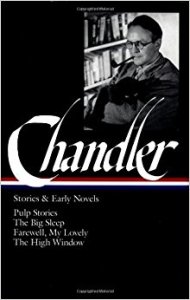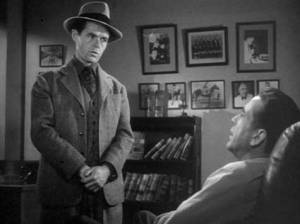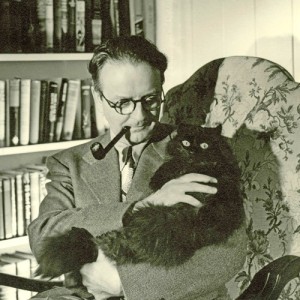Tags
American literature, crime fiction, crime novel, hardboiled detective, Philip Marlowe, Raymond Chandler, The Big Sleep
 On the face of it, this is gonna be a short review. The Big Sleep (1939) is Raymond Chandler’s first Philip Marlowe novel, an acknowledged classic of the crime genre, eminently quotable and fun, though a bit lacking in the “subtext” game. Basically, corruption is corrupting. This seminar is over, let’s go talk about the green light on the dock in Gatsby instead.
On the face of it, this is gonna be a short review. The Big Sleep (1939) is Raymond Chandler’s first Philip Marlowe novel, an acknowledged classic of the crime genre, eminently quotable and fun, though a bit lacking in the “subtext” game. Basically, corruption is corrupting. This seminar is over, let’s go talk about the green light on the dock in Gatsby instead.
We might also make mention of the Hollywood film adaptation of 1946, another classic of its type directed by Howard Hawks and starring Humphrey Bogart and Lauren Bacall. Both book and film are famously confusing and the mystery of the chauffeur’s death has never been solved. You just have to go with it. Because of the Hays Code the film had to be toned down, with references to pornography and homosexuality veiled, and because of the Bogie/Bacall sensation the character of Vivian Regan had to hog the screen and be redeemed in the end. You’d think this would be a recipe for an unmitigated disaster but the movie is every bit as good as the book, though with a very different aftertaste. Take my advice and fast-track both of these experiences. For quality entertainment with no explosions, you can’t do better.
“I like roulette. All the Sternwoods like losing games, like roulette and marrying men that walk out on them and riding steeple-chases at fifty-eight years old and being rolled on by a jumper and crippled for life. The Sternwoods have money. All it has bought them is a rain check.”
The Big Sleep is a remarkably cynical bit of work, perhaps the moreso for having a knight in tarnished armour as the main player: I agreed with Captain Gregory that Eddie Mars would have been very unlikely to involve himself in a double murder just because another man had gone to town with the blonde he was not even living with. It might have annoyed him, but business is business, and you have to hold your teeth clamped around Hollywood to keep from chewing on stray blondes. If there had been a lot of money involved, that would be different. But fifteen grand wouldn’t be a lot of money to Eddie Mars…
…
_____ was dead and Carmen would have to find some other shady character to drink exotic blends of hooch with. I didn’t suppose she would have any trouble. All she would have to do would be to stand on the corner for five minutes and look coy. I hoped that the next grifter who dropped the hook on her would play her a little more smoothly, a little more for the long haul rather than the quick touch.
Carmen is the star of the book, moreso than any of the toughs that Marlowe goes up against, and all of Chandler’s best writing comes out in The Big Sleep‘s emblem of corruption: A pretty, spoiled and not very bright little girl who had gone very, very wrong, and nobody was doing anything about it. To hell with the rich. They made me sick. A mad, moneyed nymphomaniac in L.A. is practically made to be exploited. Horrid as she is, Marlowe tries to do right by her, perhaps even pities her a little, and all it gets him is foul language, hatred and monetary and sexual bribery. On the L.A. scene all a man like Marlowe can really do is get dirtied in his search to find some innocent to protect. There are no innocents. Already and without changing any ingredients, the tone here is much more bitter than in Chandler’s short stories. A lack of classy dames?
The giggles got louder and ran around the corners of the room like rats behind the wainscoting.
So The Big Sleep is perfectly pitched, paced and delivered. It receives my highest recommendation across the board and can, I suspect, entertain all but the most ideologically determined to hate it. It has in Marlowe an avatar of human decency up against all the ills of mankind and for the denouement only a haunting vision of innocence gone to the grave: “What did it matter where you lay once you were dead? In a dirty sump or in a marble tower on top of a high hill? You were dead, you were sleeping the big sleep, you were not bothered by things like that. Oil and water were the same as wind and air to you. You just slept the big sleep, not caring about the nastiness of how you died or where you fell. Me, I was part of the nastiness now. Far more a part of it than _____ _____ was. But the old man didn’t have to be.” This is certainly more artistic than what Hollywood came up with for a finale. Hollywood has always had more misses than hits but it has historically known what the people want to see. We want to see the hero win the girl, face the villain and bring him down and we want to see some form of justice done for Harry Jones, a small man in a big man’s world, whose dignity wins us over as surely as it does Marlowe (and moreso when faced with the brilliant casting of Elisha Cook, Jr).

If it’s all a little bit fake, it’s also undeniably satisfying to see. Forget your troubles and watch the good guys win. The film completely changes the moral of the story without shortchanging the quality. If it’s the loser, it is only because a bittersweet taste lingers longer and creates a texture that is more unique. As I said, the film is a worthy companion and even improves on the already razor sharp dialogue.
But that’s for a movie review, if I ever wish to return to the subject. Perhaps the only real failing of The Big Sleep lies in whether you see it as a mystery or a crime novel. Marlowe does trip through an investigation and start a second one, collecting guns and fending off women on the way. It’s all done in entertaining fashion but plotwise it feels ramshackle, and this was done deliberately. Chandler’s mission was to put crime back in the hands of those who commit it, so instead of too-clever, super-clued murders we’re given sloppy executions and sordid coverups which could be dismantled in a heartbeat were anyone interested in looking. This is a plus in my book, though I do wonder… if I hadn’t watched the film obsessively when I was fifteen would I have been lost among all the small-time crooks and offscreen characters? Regardless, I did not ever think to read it as a mystery, simply as outstanding crime fiction. Unless you are completely allergic, you should give Marlowe a chance.

“The camera is EVIL.”

Pingback: “The Big Sleep” by Raymond Chandler – Tangled Yarns